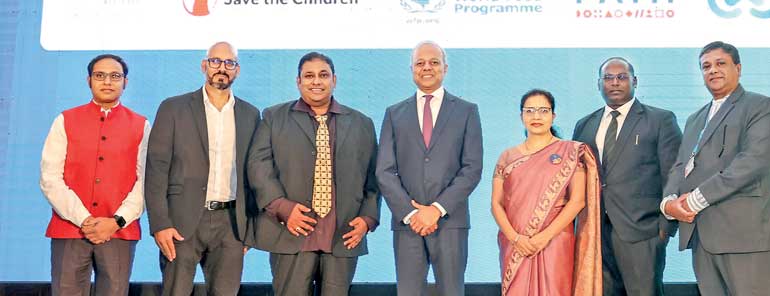Monday Feb 23, 2026
Monday Feb 23, 2026
Tuesday, 9 July 2024 00:10 - - {{hitsCtrl.values.hits}}

From left: PATH Nutrition State Lead Abhishek Kumar, Connect To Care Chairman Chandita Samaranayake, Grains n Green Managing Director Roshan Perera, President’s Chief of Staff and National Security Senior Adviser Sagala Ratnayaka, Gates Foundation India Country Office Nutrition Lead Ruchika Chugh Sachdeva, PATH Program Manager Dr. Danie Shajie, and WFP Nutrition and School-based Programs Head Dr. Kalana Peiris
The Government of Sri Lanka announced that Sri Lanka has now gained the capacity to produce fortified rice kernels.
The kernels are enriched with folic acid and iron through an extrusion process creating nutrient-rich grains that will be blended with regular rice to produce fortified rice.
This initiative was highlighted as an urgent priority of the Government following the economic crisis, which severely increased food insecurity and malnutrition, and the Presidential Secretariat’s commitment to the cause was highlighted by President’s Chief of Staff Sagala Ratnayaka. This fortified rice will be used to combat micronutrient malnutrition with kernels being distributed via the Government National Free School Meal Program.
The transfer of extrusion technology was prioritised by the Presidential Secretariat, and enabled by the World Food Program (WFP), The Program for Appropriate Technology and Health (PATH), the Bill & Melinda Gates Foundation, Akshata, and Connect To Care.
To mark the introduction of this capability, the Presidential Secretariat Support Unit, supported by Connect To Care and PATH, organised a workshop at the Galle Face Hotel.
The workshop, which brought together key stakeholders from the Government, private sector, international organisations, and civil society, explained the benefits of staple food fortification and made clear the potential for tech transfer with the collaboration of the Government, private sector, and international partners.
The event featured a keynote speech by Ratnayaka who emphasised the Government’s vision and support for food fortification initiatives. Ratnayaka stated: “The Rice Fortification Project supported by the Gates Foundation is a testament to our commitment to improving the health and well-being of our children. We are grateful for the support of our partners WFP, PATH, and Connect To Care in making this vision a reality.”
Grains n Green Managing Director Roshan Perera remarked: “We are proud to be the first fortified rice kernel producer in Sri Lanka. This project will have a lasting impact on the nutritional status of our population, especially our children.”
Key highlights of the workshop:
Locally-produced fortified rice kernels: Akshata from Grains n Green, as the private sector partner for the Gates Foundation Rice Fortification Project, is making a pioneering investment to become the first fortified rice kernel producer in Sri Lanka. This initiative will significantly benefit the National School Meal Program, ensuring that children receive essential nutrients needed for their growth and development.
Free School Meal Program: Under the Free National School Meal Program, a nutritious and balanced meal is provided at no cost to children enrolled in grades 1 to 5 at selected schools. Currently, the Education Ministry, together with the WFP, ensures the meals are provided to over 1 million children across the country. The fortified kernels will be included across the program, increasing nutrition and enhancing national capacity as fortified rice kernels have previously been imported from India.
Key attendees and collaborators: The workshop featured prominent figures, including the Chief of Staff to the President, representatives from Government ministries, State organisations, the Gates Foundation, the WFP, and PATH. Additionally, donor agencies such as Save the Children, USAID, UNDP, UNICEF, WHO, and FAO as well as Government ministries and agencies and prominent private sector individuals were also present.
Panel discussions and breakout sessions: The event included insightful panel discussions on the progress, gaps, and unmet needs in the field of food fortification. Breakout sessions addressed specific topics such as quality assurance, storage locations, transport systems, and the expansion of fortification programs to other social protection programs and wider markets.